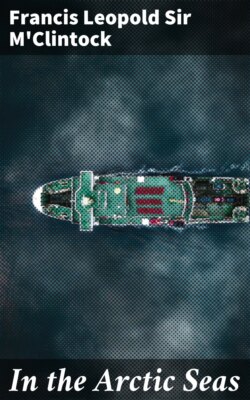Читать книгу In the Arctic Seas - Sir Francis Leopold M'Clintock - Страница 4
На сайте Литреса книга снята с продажи.
Footnote
ОглавлениеTable of Contents
[1] Viscount Palmerston.
[2] See the Memorial (Appendix) addressed to the First Lord of the Treasury, headed by Admiral Sir F. Beaufort, General Sabine, and many other men of science, and which, as President of the Royal Geographical Society, I presented to the Prime Minister; and also the speech of Lord Wrottesley, the President of the Royal Society, who, in the absence of the lamented Earl of Ellesmere, brought the subject earnestly under the notice of the House of Lords on the 18th of July, 1856.
[3] Since his return to Copenhagen, Petersen has been worthily honored by his Sovereign with the silver cross of Dannebrog.
[4] Captain Allen Young of the merchant marine not only threw his services into this cause, and subscribed £500 in furtherance of the expedition, but, abandoning lucrative appointments in command, generously accepted a subordinate post.
[5] For a résumé of all the plans of research and the speculations of seamen and geographers, see the interesting and most useful volume of Mr. John Brown, entitled, 'The North-West Passage and Search after Sir John Franklin,' 1858. In an Appendix to this work we learn, that from the earliest Polar researches by John Cabot, at the end of the 15th century, to the voyage of M'Clintock, there have been about 130 expeditions, illustrated by 250 books and printed documents, of which 150 have been issued in England. Amidst the various recent publications, it is but rendering justice to Dr. King, the former companion of Sir George Back, to state that he suggested and always maintained the necessity of a search for the missing navigators at or near the mouth of the Back River.
[6] The letter A in Baffin Bay (fig. 1) indicates the spot where Franklin was last seen. In fig. 2, B is the winter rendezvous at Beechey Island; C the greatest northing of the expedition, viz. 77° N. lat.; Z the final beset of the 'Erebus' and 'Terror;' the extreme north and south points of their voyage being represented by two small ships.
[7] In 1850.
[8] See a most heart-stirring sketch of the last voyage of Sir John Franklin, by Captain Sherard Osborn, in the periodical Once a Week, of the 22d and 29th October and 5th November last. Possessing a thorough acquaintance with the Arctic regions, the distinguished seaman has shown more than his ordinary power of description, in placing before the public his conception of what may have been the chief occurrences in the voyage of the 'Erebus' and 'Terror,' and the last days of Franklin, as founded upon an acquaintance with the character of the chief and his associates, and the record and relics obtained by M'Clintock. This sketch is prefaced by a spirited and graceful outline of all previous geographical discoveries, from the day when they were originated by the father of all modern Arctic enterprise, Sir John Barrow, to whom, and to many other eminent persons, from Sir Edward Parry downwards, I have in various Geographical Addresses offered the tribute of my admiration.
[9] In his volume before cited, p. xii., Mr. John Brown gave strong reasons (which he had held for some time) for believing in the existence of the very channel which now bears the name of M'Clintock. It is, however, the opinion both of that officer and his associates, as also of Captain Sherard Osborn, that Franklin could not have reached the spot where his ships were beset by proceeding down that ice-choked channel, but that he must have sailed down Peel Sound.
[10] Much of this Appendix will be prepared by Dr. David Walker.
[11] At the Aberdeen meeting the Prince Consort thus spoke:—"The Aberdeen whaler braves the icy regions of the Polar sea to seek and to battle with the great monster of the deep; he has materially assisted in opening these ice-bound regions to the researches of science; he fearlessly aided in the search after Sir John Franklin and his gallant companions whom their country sent forth on this mission; but to whom Providence, alas! has denied the reward of their labors, the return to their homes, to the affectionate embrace of their families and friends, and the acknowledgments of a grateful nation."
